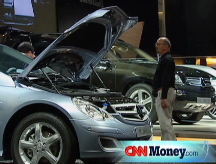Drive out of poverty with a car
A good, reliable automobile can make the difference in getting up from the bottom, and some groups want to give a leg up.
 |
| Wendy Mitchell with her 1996 Honda Accord |
| 36 month new | 5.91% |
| 48 month new | 5.98% |
| 60 month new | 6.03% |
| 72 month new | 3.78% |
| 36 month used | 6.31% |
NEW YORK (CNNMoney.com) -- If filling your tank with $3.60 a gallon gas is a serious economic hardship, ask yourself this: What if you didn't have a tank to fill up?
Wendy Mitchell of Middlebury, Vt. is a single mom who moved there from Florida in 2006 looking for better schools. Within months, she said, her Chevrolet Blazer blew a rod and, without a job or much savings, she was left without a car at the beginning of a rural New England winter.
"I was totally devastated," she said.
Despite car-ownership costs, including insurance, repairs and fuel, the majority of even the poorest Americans own cars, according to U.S. Census data - and for good reason. In this country, life without one can be difficult at best and unmanageable at worst.
Even cities with solid public transportation networks are set up to do one thing well: move people in and out of central business districts. "It takes a long time if you aren't doing exactly that," said Margy Waller, executive director of the policy research group Mobility Agenda.
And these days, she pointed out, the best jobs usually aren't in the center of the city.
Employers cite transportation problems as the second-most common reason for losing entry-level workers, said Waller. The number one problem is child care.
"By giving them a car, we take care of both," said Martin Schwartz who runs Vehicles for Change, a non-profit group that provides donated used cars to carefully screened applicants in Maryland and Virginia. The cars aren't free. They cost recipients about $900 to $1,200, but that's still much less than retail value, and they come with a six-month warranty.
Vehicles for Change is one of about 150 non-profits around the country that provide low-cost used cars to the needy, according to Opportunity Cars, a national network of such groups.
Good News Garage is another group. Operating in four New England states, it found and fixed up a 1996 Honda Accord for Mitchell.
"I cried that day," Mitchell said of getting her car.
It now takes her about 30 minutes instead of more than an hour, she said, to get to her $8 an hour part-time job at the Boys and Girls Club of America. And now she can do something with her kids, she said, other than leave them at home once she manages to get them there, which she used to do on foot or by hitching rides.
The groups say their work really makes people's lives better, and doesn't just give them an easier way around. Good News Garage cites data from an informal survey of its clients conducted by a local graduate student.
According to the survey, 61% of Vermonters who had received cars from Good News Garage said they reduced their dependence on the Temporary Assistance for Needy Families, a federal aid program, as a direct result of having a car. More than half said they had stopped using TANF altogether.
And 60 percent of Good News Garage customers said they had gotten a job because they had a car, while 83% said they were able to keep a job because of it.
Some urban experts say these programs seem like they're helping needy individuals, but really they're just saddling them with the added costs of car ownership.
"The cost of urban sprawl has come to roost on working households and low-income households," said Scott Bernstein of the Center for Neighborhood Technology in Chicago. A better solution, he suggested, would be improving mass transit and giving businesses more incentives to move nearer to transit lines - or to provide their own commuting services.
"I'm not saying anybody should denied something," said Bernstein, "but lets face it, there's nothing fictitious about the gas price crisis." Another short-term solution, he said, is to provide shared cars rather than helping individuals to own cars.
The CNT operates one such service in Chicago - iGo car sharing - that allows members to use a car for $6 to $8 an hour. There are similar not-for-profit services in Philadelphia, San Francisco and a few other U.S. and Canadian cities.
But, for many individuals, there isn't much alternative to simply owning a car, even in big cities, car-ownership advocates say.
Philip Schools, a recovering drug addict, lives near Baltimore and works at a Home Depot. He said used to spend up to six hours a day simply getting to work and back on mass transit.
Getting a used Buick from Vehicles for Change cut his commute to a half hour each way and has allowed him time, he said, to work on starting his own lawn maintenance business to earn more money.
Almost as important, said Schools, it has given him a sense of personal responsibility while giving him an opportunity to build a credit history. "It's not just about the vehicle," he said, "It has other component parts. ![]()


